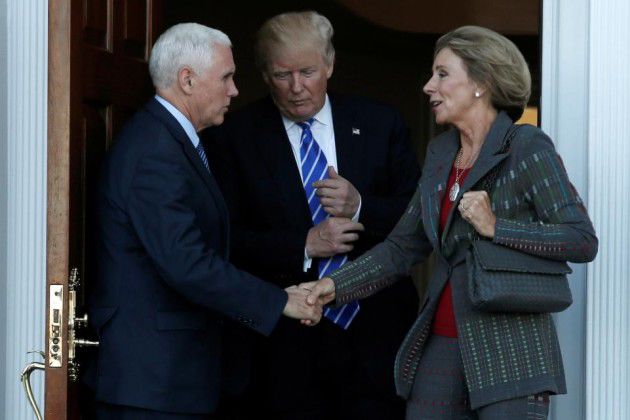Pence breaks tie, affirms DeVos as Education Secretary
February 14, 2017

Last Tuesday, Vice President Mike Pence affirmed Betsy DeVos, President Donald Trump’s cabinet selection for education secretary, making the Senate vote 51-50. This is the first time ever, the Vice President acted as the tie breaker for a cabinet secretary. The 51 “yes” votes only constituted Republicans, and “no’s” included all 46 Democrats, Independents and two Republican senators from Maine and Alaska.
DeVos, a 59-year old billionaire from Michigan, has worked as an advocate for the “school choice” movement—encouraging kids to attend charter and private schools instead of an underachieving public schools. She has donated much of her own money into charter schools in Michigan that have been unsuccessful. Four times elected as chairperson of the Michigan Republican Party, DeVos has also donated to the campaigns of many Republican senators—senators who voted in favor of her position in the cabinet. Though she is a benefactor of education, DeVos herself has never taught in, managed or attended a public school, leading many to believe she lacks the knowledge and experience to serve as education secretary.
If DeVos’s qualifications to be education secretary were not already a point of controversy, her stance in support of charter schools and voucher programs is of equal contention. Charter schools are government funded but autonomously run–meaning they do not have to adhere to many of the standards and bureaucratic pathways of the public school system. Charter schools do not limit attendance by zip code. Many are centered in big cities and often attract minority students from low-performing public school systems. According the Wall Street Journal, charter school enrollment has grown 219 percent from 2004-2014 with about 3,400 in the United States.
Those opposed argue that many charter schools have failed and students achieve less or no better than in public schools, even with differing standards of accountability. Charter schools do not draw additional educational funds, but instead pull from the budget allotted for the public school system. Many opposed also argue that taxpayer dollars fund these expensive institutions, yet they are privately run and are only accessible to a small number of students, leaving taxpayers unrepresented. Charter schools also decrease the importance of teachers’ unions. Many charter schools are in urban centers and are disproportionately populated with low-income, African-American and Hispanic students.
“There’s never been an education secretary who has been overtly hostile to public education,” said Randi Weingarten, head of the American Federation of Teachers, one of the largest unions, in the Wall Street Journal
Those in favor of charter schools note that charters in inner cities have been found to often outperform public city schools. Though several charters have failed, many have also succeeded. The quality of the schools varies by location, making it difficult to make a broad-brush assessment of the accountability and achievement of the schools. Supporters argue that charters provide incentive for public schools in the same district to become more efficient as they lose students, and gives the public school incentive to improve.
Though DeVos has only just begun her term as Secretary of Education, Pence clearly defines how the Trump administration hopes to approach public K-12 education in the United States: “Our children’s futures should not be determined by their zip code,” he said. “Students should not be trapped in a system that puts the status quo ahead of a child’s success.”


